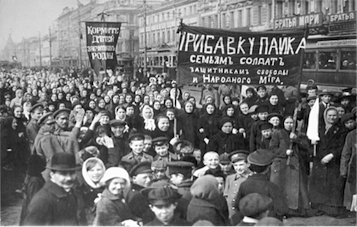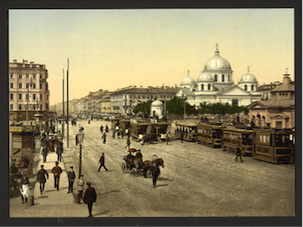What were the causes of the Russian Revolution? When and how did it begin? And what was more important in bringing it about - the social grievances of the peasants and the workers, or the political aspirations of the middle class? In this section we will be asking how stable the Tsarist system really was? We will look at the revolutionaries, including Lenin, and ask how much influence they really had? We will also focus on Nicholas II and ask what role he played in his downfall? You will also find some extracts from books, original photographs and videos, and a reading list. Register here to get information on accessing more materials including my responses to exam questions on these themes.

Demonstration St Petersburg, 23 February 1917, Origins of the Russian Revolution, February Revolution, 1917
The Russian Revolution was long expected but came as a surprise in February 1917. None of its 'leaders' expected it to happen how and when it did. Most revolutions are like that. That's what makes them revolutionary.

Street scene, St Petersburg, 1900
Russia remained a relatively stable society until the final decades of the nineteenth century. The Tsarist Empire was untroubled by the revolutions that shook Europe's other monarchies in 1830 and 1848. Its huge army crushed the Polish uprisings of 1830 and 1863, the main nationalist challenge to the Tsar's Imperial rule, while its police hampered the activities of the small groups of radicals and revolutionaries, who were mostly driven underground. Read more...
Throughout his reign Nicholas gave the impression of being unable to cope with the tasks of ruling a vast Empire in the grips of a deepening revolutionary crisis. True, only a genius could have coped with it. And Nicholas was certainly no genius. Read more...
The power of the state was only very weakly counter-balanced by an independent landed aristocracy. This was a major difference between Russia and Western Europe, where since feudal days the landowning nobles had limited the power of the monarchy. Read more...
The crucial weakness of the tsarist system was the under-government of the localities. Read more...
The liberal intelligentsia welcomed the Emancipation of the Serfs as a national reawakening. Through the zemstvo organs of self-government established in 1864 they threw themselves into building rural schools and hospitals. Read more...
After the collapse of the 'To the People' movement, with its false idealization of the Russian peasant, the Marxist message seemed like salvation to the radical intelligentsia. Read more...
There is a legend that on hearing of his brother's death Lenin remarked to his sister Maria: 'No, we shall not take that road, our road must be different.' Read more...
Forced off the land, millions of peasants came into the towns, or worked in rural factories and mines. Read more...
Trotsky answered this by distinguishing between... Read more...
These images tell us about the Russian economy and the conditions of the working class and the peasantry before 1914. Read more...
Here are some exam-like questions. Read more...
A recording of a lecture/class using primary documents. Read more...
A list of further reading. Read more...

